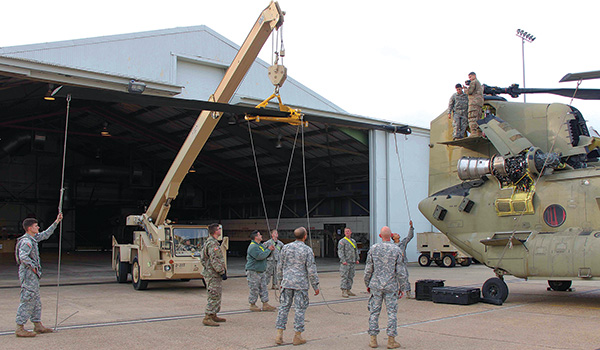
Branch Command Sergeant Major / By CSM Gregory M. Chambers: Managing our enlisted experience in today’s Army is imperative to our future combat success. The culture in our units has to foster an environment in which Soldiers want to learn, to progress and to become professional Soldiers.

Members of the 1st Air Cav remove an aft rotor blade from a CH-47 Chinook during maintenance at Ft. Hood, TX April 5, 2016./U.S. ARMY PHOTO
Documenting this experience is essential as Soldiers move around in our branch. Mid-grade leaders should have the ability to quickly assess experience on newly assigned Soldiers in order to place them on the team where they will be efficient and effective immediately. This environment or culture will directly contribute to your combat readiness in an era of sustained readiness.
Managing talent or “experience” for personnel can be broken down into two categories, technical and tactical, an individual’s Military Occupational Specialty (MOS) and professional development, and an individual’s training as it concerns being a professional Soldier. Talent represents the unique intersection of skills, knowledge and behaviors in every person, it represents far more than the training, education and experience that the Army provides.
Developing Skill
Soldiers learn and gain experience through three different domains, the institution, the organization and self-study. Soldiers become skilled at their MOS by doing tasks that are relevant to their MOS in a repetitive or cyclic manner, e.g., an aircraft phase inspection or controlling aircraft in an airfield ATC tower. Experience gained as a professional Soldier is constant, but the key to professional growth for a Soldier is professional mentorship through tough and strict standards in everything we do. Training provides Soldiers the Task, Condition and Standard, repetitions and strict enforcement of the standard equates to Soldiers being skilled at that given task. Are you creating trained Soldiers or are you developing skilled Soldiers? What environment do you qualify your Soldiers in with their assigned weapon? Do you train them to the hardest condition they may face in combat? Do you make them shoot their weapon with their non-dominate hand? Do you make them shoot under night vision goggles?
We execute training daily in the Aviation Branch, whether it’s flying an aircraft, controlling an aircraft, sustaining and maintaining an aircraft or providing logistics for an aircraft. But at the end of the day, everything we do centers around our combat power, our helicopters that we use to support the maneuver ground force. Although the above are tasks that we must complete on a daily basis to be successful, they provide a wealth of opportunities to grow and progress our Aviation Soldiers. It is absolutely critical that we capture and document how well our Soldiers do during these events.
Communicating Soldier Experience
How do you document your Soldier’s training? Through counseling, Digital Training Management System (DTMS), the Digital Job Book, internal SOPs? More importantly, how does that individual Soldier’s “experience” transfer to another unit? How are you ensuring that the gaining unit fully understands what the Soldier is fully qualified to do or what experience they have? Do you understand what the “Critical Tasks” are for all your Soldiers? Are you documenting those critical tasks? Soldiers thrive on competition, do you have progression boards in the platoon office to depict task completed, scores achieved or qualifications attained? This public information is essential so junior leaders can employ Soldiers in the absence of the primary leaders. Leaders waste valuable time “reassessing” Soldiers on their ability and what experience they have when they come to a new unit. Furthermore, we waste valuable time when we do not integrate Soldiers in a timely manner into a given unit. Integration counseling is absolutely essential to a Soldier’s future contribution to a unit. They must clearly understand the unit’s mission, the SOP that governs that mission, and how they contribute to the accomplishment of that mission. Leaders must know how to employ the experience of newly assigned Soldiers immediately.
The Army has systems in place today to track individual readiness as it concerns regulatory training requirements that can be seen by gaining units. The new military job book is now online for leaders to use. But Aviation is a highly technical field with highly sophisticated aircraft that require years of experience to gain proficiency. Capturing that experience in detail will enable leaders to quickly assess Soldiers and to employ them where their experience will be highly beneficial. In the future we will document this finite experience and it will transfer with the Soldier. Until then, I highly encourage units to develop systems that capture your Soldier’s experience and ensure that documentation transfers with the Soldier as they progress through their career. “Flattening” the experience cylinder between units will help us build a stronger Aviation Branch in a more efficient manner.
Above the Best!
CSM Chambers
This email address is being protected from spambots. You need JavaScript enabled to view it.
CSM Gregory M. Chambers is the command sergeant major of the Aviation Branch and the U.S. Army Aviation Center of Excellence, Fort Rucker, AL.










